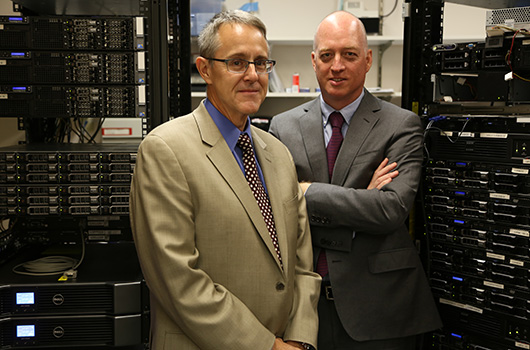Cyber Law Experts Teach New Seminar

Albert Rees of the Justice Department and Thomas Dukes Jr. '94 of the State Department are teaching a new seminar that surveys the cyber law and policy landscape.
by Eric Williamson
A new class at the University of Virginia School of Law that examines the rapid development of cyber law and policy is being taught by two experts in the field, including a 1994 alumnus of the Law School.
“We’re focusing on these very dynamic, developing law and policy frameworks that are still very much in their infancy,” said lecturer Thomas A. Dukes Jr. ’94, who serves as deputy coordinator for cyber issues at the U.S. Department of State, where he oversees the development and implementation of U.S. international policy in such areas as cybercrime, Internet governance, cybersecurity and national security.
Dukes and Rees said laws governing computers and computer networks must consider everything from liability, property and privacy issues to armed conflict and national security concerns. And the old rules that have been developed for the physical world don’t always translate easily, or apply neatly, to cyberspace.
“One of the key challenges for lawyers practicing in this area is sorting out which law (or laws) apply. For instance, where do you bring/defend a lawsuit/claim when you are a company that has data centers in the U.S., Ireland, Japan and other places, with data moving around among them all of the time?” Dukes said. “There are enormous questions about whose laws apply to that information, or if any law applies at all.”
Because information crosses borders, international law is filling in some of these gaps, Rees said.
Among the key topics the course explores is the behavior of state and non-state actors in cyberspace.
“There is a general consensus coming about that international law, particularly international humanitarian law, at the most general level, applies to activities that occur on networks, the Internet and cyber infrastructure,” he said.
Dukes said a U.N.-convened group of government experts from 20 countries, including the U.S., the U.K., Japan, Russia and China, is actively exploring the application of international law in cyberspace, the development of norms of behavior for state actors, and the creation of cyber confidence-building measures.
“In many ways however, that has only started the debate, with differing national views of what that really means, and how it will work in practice,” Dukes said.
The seminar also will include an international negotiation exercise in which students will take on the role of key nations leading the debates on cyber law and policy issues at the United Nations and determine how real-world law might solve complex and controversial issues.
Rees predicted that UVA Law, which offers a course in cybercrime as well, will produce some of the leading cyber law practitioners of tomorrow.
“I think that students graduating from this law school are going to be the ones who advise policymakers and clients on cyber matters and argue these cases in front of the judges who will increasingly rule on these matters,” he said.




